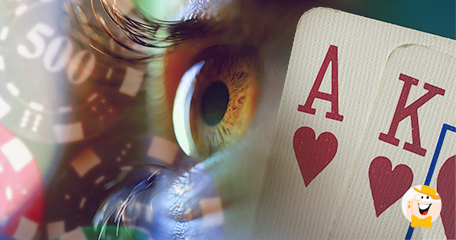
…While rolling through the psychology, seven players’ profiles, sixteen MBTI gambling personalities, and proper gambling regulations.
For those that play, the sight is all too familiar. Dices, cards, or wheels, ignorant of wishes and hopes, reveal their random offerings in an almost ceremonial manner. Players, overwhelmed with delight or despair and anything in between, act upon resulting chances the best they know how. Sensations are to last briefly, for the game will soon have its next say. The revolving contest between optimism and pessimism, vulnerability and resilience, skillful and knee jerk reactions — ultimately, luck, choices, and balances — will go on and on until the very last moment of the gamble with no tie as an outcome.
Once all is played, people will walk away from it with different perceptions, emotions, and experience. Sometimes a world apart, other time lives apart, but mostly with bittersweet laughs as they brace for the next round.
Regardless of the luck, the games’ takeaways are always a matter of players’ choice and inner balance.
The impact of 2018, a seminal year for the American and worldwide gambling, will reverberate on this notion for years to come as the awareness and volume of this complex social phenomenon rose to unprecedented levels.
Current national and global initiatives to regulate it properly are oriented toward the obvious need to finally integrate gambling into our society in a legal and meaningful way.
To put it into perspective, according to H2 Gambling Capital the overall amount of all worldwide games of chance — online and land-based casinos, sports betting, racing, gaming machines, bingo, and lotteries — exceeds $446.07 billion in 2018.
It is close to the combined annual revenue of 10 largest pharmaceutical companies in the world, for the same period. It would be enough to finance NASA for the next 20 years and to run all Formula One teams for 160 years.
That’s quite an investment — and testimonial of human nature — we make into “taking a risk in exchange for some greater value [and] potential to gain huge and quick wealth”.
It also underlines multifaceted phenomenology of gambling in developed countries that constitute for the majority of the global market.
Fifty-three percent of players come from the United States of America (25.6%), China with SARs (16.4%), and Japan (11.3%). Nine other countries contribute with single digits percentages ranging from 5.2% to 1.6% (Italy, the United Kingdom, Australia, Germany, Canada, France, South Korea, Spain, and Singapore). Eighteen countries amounts for below zero percentages of participants, 0.7% to 0.3% (the Netherlands, Philippines, Sweden, Finland, South Africa, Brazil, Greece, Malaysia, Portugal, Belgium, Ireland, Czech Republic, Switzerland, Austria, Norway, New Zealand, Poland, and Taiwan).
Thirty countries constitute 91.7 percent of worldwide gambling; remaining 163 accounts for 8.3 percent.
We know nothing about players’ backgrounds, careers, life stories, reasons and motivations, intellectual patterns, belief systems, or anything else for that matter. We can only contemplate so much. Or occasionally find out in the news.
But…
We do know to which group of gamblers they belong.
If it’s up to the psychology, all of them — no, scratch that, all of us — fall into one of the seven categories of gamblers’ personalities.
Driven by our perpetual pursue to address gambling in socially responsible manner and a goal to create awareness of legal and well-regulated environment for games to be played, we wanted to take a long look into their mindsets, psychology, and the gambling world we live in, allowing our creative and investigative juices to flow through behavioral, regulative, and scientific pathways that shape games of luck and skill — a domain of luck, chances, and balances.
We will be joined by a representative of each of seven gamblers’ categories and sixteen types of MBTI personalities, as we take a closer look into social takeaways from pastime we so keenly visit.
Let’s roll.
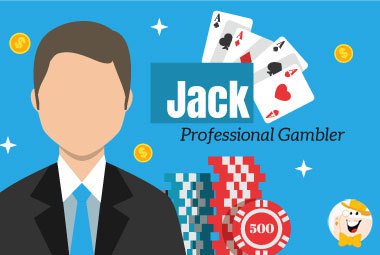
Jack, a Professional Gambler
I don’t even call it gambling. The term itself implies luck. I don’t do luck; it’s for hobbyists. I do skills, knowledge, research, strategy, and training. I do this for the living, so I call it playing.
I play blackjack, poker, or backgammon. Baccarat, roulette, slots not so much — too volatile, too susceptible to luck, too mechanical.
I’ve established a Gambling Expeditionary Corps in me. I named it so, my ego trip; it sounds more armada that way.
I got Recon guys to reconnoiter the battlefield. Casino, game, players. History, practices, habits. Dealer sex, mindset, hands. I’m not gonna set my foot on the ground if it’s not sound.
I collect intelligence. Communication, rumors, preferences. Customs, experiences, environment. Statistics, odds, calculations. I’m not going to be surprised.
If it’s all good, I go in. Don’t do piecemeal deployments. It’s always combined arms. To your language, that translates into awareness, stability, patience, perseverance, methodology and betting systems. I play tight, always get my money in good, run probabilities, fold early, and don’t get off rails.
Also, I read a lot. Do you know that every General is actually a Ph.D.? Not in terms of a diploma but in terms of accumulated formal education. So, books rules. Can’t have stupidity in my command center.
Finally, financial acumen. I can’t tilt just because the loss is imminent. Ups and downs are huge, no secret about that. To effectively manage them, I invest my earnings elsewhere so I can get back in the game when an unavoidable slip happens.
How long will I continue to do this? As long as I can. One thing is for sure. If I go down, I will go knowing that I vested everything at my disposal in the good fight.
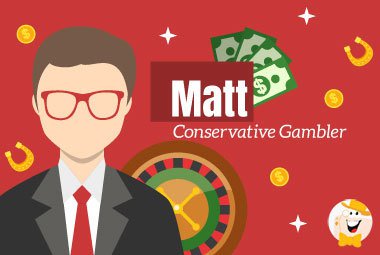
Matt, a Conservative Gambler
It’s all about fun, man, and fun shouldn’t cost too much. I gamble not to gain money but to have a great experience. Ever heard of ‘aim small, miss small’? That’s me, all right.
Whenever I vacate abroad, I like to hit slots or a twenty-one just to feel the thrill. No high-stakes games, no sweating, no drama. Occasionally I like to play roulette, mainly announced bets.
I really don’t care that much to know all the rules. Somebody always fills me in. When I don’t know what to play, I either follow my intuition or go against the other peoples’ advice. Same goes for strategies, statistics, odds, calculations. I mean, I have more than enough of mathematics in my business.
If I win, that’s it — I stop. Mission accomplished. Wouldn’t wanna spoil the moment for the world. Which is to say, it’s not so often.
Losses? I don’t want problems in my life. Not that I don’t have any, but I don’t need more. Professional gamblers think I’m fake; maybe. But I’m just not made out of that cloth. I think I would drop dead out of fear it I lost a large sum of money.
Don’t get me wrong. I take risks in my trading. But in gambling, I stay away from tipping point by default. It’s bad for my finances, bad for my image, bad for my marriage, though not that bad to not try it every once in a while.
Will I stop? Probably not, as long as it gives me fun and thrills.
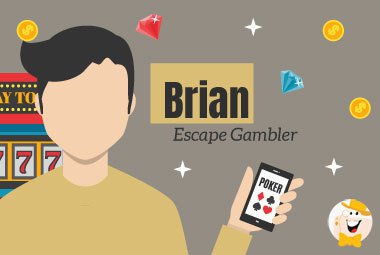
Brian, an Escape Gambler
They say that junkies take drugs for not being able to handle the pain of reality, to escape from it. Same was with me and gambling. While many people like me won’t admit it, I’m damaged goods. And, to tell you the truth, I don’t see any problem with that — I had the courage to try and fail.
So for me, gambling was the ultimate relief and escape (for I don’t do drugs). When my depression, anxieties, anger, loneliness, or boredom took better of me, I used to gamble. It gave me a comfy, shielded getaway of forgetfulness as I waited for the outcome of, usually, online slots or online poker. You’re right — I don’t like the company of people.
I didn’t care all that much whether I’ll lose or win. If I lost, I kept saying it’s what I deserve. If I won, I remember thinking not even that will square me away. But it sure as hell provided for analgesic effect if nothing else.
Thing is, I couldn’t gain a thing even if I’d won a million bucks. (Good for me that I didn’t, I’d probably waste them.) It was never about luck and choices, but only about my inner balance.
Once I realized it, I sought professional help and find a viable solution for my issues.
I don’t gamble anymore. It was a temporary solution. Here and there I play when I’m on vacation, but only a few hands or so. It’s not the same as it used to be. Something changed. Probably myself.
Will I start gambling again? I don’t think so. Wouldn’t mind the fun of it, though. Because that’s what gambling should always be.
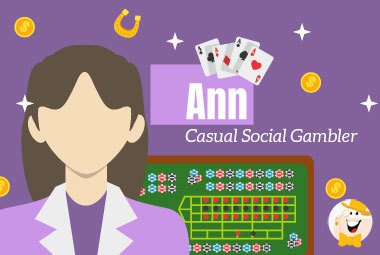
Ann, the Casual Social Gambler
It’s a recreational, entertaining habit. I like to dress well, go on the horse or greyhounds racetrack on weekends, socialize with people, and place some bets. My priorities are in that order.
Hence the enjoyable character of gambling in my life. It serves me with an opportunity to be part of a certain group of people benignly taking their chances and enticingly flirting with luck. I love the company and the hype that comes with the territory.
My family and friends like it too. It is so pleasing to do it openly and jokingly with everyone else doing the same.
Naturally, I play the lottery every week. (To tell you the truth, I wouldn’t play it so often, but what if my combination wins while I’m self-excluded? That would be really silly, wouldn’t you agree?)
When on vacation, usually in Europe, I indulge myself in roulette at a local casino — so posh.
That’s it. I don’t do it more than a couple of times per month, and I’ve limited myself with a budget, too.
I don’t want to be associated with gamblers that make troubles. I don’t want someone to tell my daughter that mommy’s got a bad habit. I’m not going to allow it to interfere with my personal and professional obligations, never mind to reflect on my financial status.
It’s like anything you do in life, I guess. You can do it professionally, depend on it, and here-and-there end up with being owned. Or, you can do it recreationally, have great time and fun, and more often than not, end up in owning it.
I like to own things. Particularly gambling.
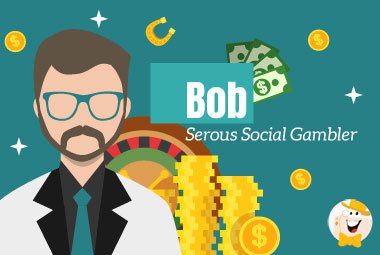
Bob, the Serious Social Gambler
You can look me as Ann 2.0 — it’s all the same only on a much larger scale. First off, it’s the only avocation I have, my primary source of fun. That’s all I do when I’m free.
I like to bet on all sports, everything that Ann does plus football, baseball, and boxing. Speaking of which, for the record — thank you, Supreme Court!
I love online casinos and go for slots and poker. I also play backgammon a lot, and I took some serious money in private games.
I like the things that Jack does. They are good habits to have. I read a lot of news, rumors — you just need to know if a left tackle got dumped by a girlfriend or his dog got hit by a car, for I wouldn’t wanna be the quarterback facing him — lineups, statistics, streaks, I mean anything related to bets I make.
Naturally, I got money and I earn well from gambling. All right, occasionally I am that player on the wrong place, at the wrong time, but what a hell!
Because the key thing for you to understand it is that I own this thing. I am in charge, I control my stakes, I rule my habits.
It’s like a devoted golf enthusiast. He spends so much money on the gear, club membership fees, best courses to visit, and all, but at the end of the day, they serve the purpose of entertaining him. Same here.
Will I slip? I don’t think so. I love myself too much to end up being deprived of everything. Egoism is my safety.

Phil, the Personality Gambler
Well, all of you are just way too public, transparent, and legal for me. If you ever watched Molly’s Game, you saw me there (no, I’m not the guy that got circuit breaker blown). I like to gamble in private joints, with vetted strangers and people I know. I like to kick some ass, get some, and above all — win at any cost.
With all these liberal pundits going around regulating gambling like it’s the traffic, I can’t really do it elsewhere. Games of my choices? Texas hold ‘em and side bets of any kind.
There’s nothing like the private high-stake game of poker. You get to do what Jack and Bob do, only far away from prying eyes. The high-rollers gambling glamour? Please. If you’re really into gambling, you go and meet your match as our grand-grandfathers did — in the room full of smoke.
Also, side bets. Putting money on all sides involved — just can’t lose. History says that side bets caused all financial crisis so far. Well, if all those banks can do it, why can’t I?
You say it’s illegal. It is. But why would anyone cut our pot? Think it’s unsafe? Buddy, I got two cops every Saturday at the poker table. Cheating? Not so much, but won’t say no to it.
They also say it is one step away from compulsive gambling. It is. It is a fine line between addiction and wealth. But it’s what drives me. To win, and to win large, on such a razor line — now, that’s a rush!
What happens when I lose? Something always does. Some solution always comes at hand. It’s not the cheap one, it’s not a conventional one, but it sure as hell is the solution. For play must go on.
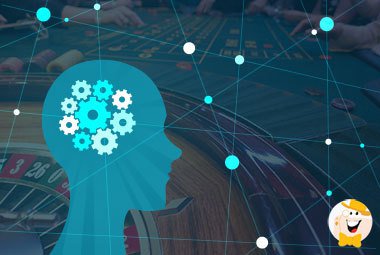
Unpaved Roads of Psychology
Before we continue and meet David, among others, it is worth to note that none of the psychological findings on gamblers’ profiles — in terms of systematic scientific approach to the matter — would be possible if it wasn’t for one psychiatrist forty years ago.
The 1970s were interesting times for gambling and sports betting.
Legally available only in Las Vegas, the volume of illegal activities across the country skyrocketed. Sixty-one percent of American population participated in some form of gambling. In 1972, the United States Department of Justice official estimate on the value of illegal games was at $29-39 billion (an equivalent to $174-234 billion in 2018). Approximately eighty percent of respondents nationwide stated they favored legalization of some form.
The Commission on the Review of the National Policy Toward Gambling — created by the U.S. Congress with a mission to study gambling as it exists in America and to develop recommendations for a formulation of gambling policies — released its 212-page Final Report in 1976, as a result of three years of research and hearings into the “controversial and divisive subject of gambling” that starts with the sentence:
“Gambling is inevitable.”
Dr. Robert L. Custer (1927-1990) realized this much earlier. His medical work on the ineludible nature of human connection to games of chance gave us categories of gamblers’ personalities and psychiatric expertise on gambling addiction.
A graduate of the Ohio State University, with a medical degree from the Case Western Reserve University in Cleveland and psychiatric training at the University of Missouri, Dr. Custer joined the Veterans Administration in 1968.
Rejecting the Freudian theory, widely accepted by leading psychoanalysts at the time, that people gamble compulsively as a substitute for sex, he believed that addicts gamble excessively not for pleasure or self-punishment, but to escape the pain.
Realizing that it’s a matter of behavior disorder — which makes it different from Brian, an escape gambler — Dr. Custer researched psychological addiction of compulsive gambler “that play to relieve some kind of psychotic pain. Whether he wins or loses, just being in action relieves the pain.”
In 1974, he established the first clinic for compulsive gambling at the VA hospital in Brecksville, Ohio.
Six years later, fueled by his efforts, the American Psychiatric Association classified compulsive gambling as a psychological disorder of impulse control, a chronic and progressive illness that can be diagnosed and treated.
In 1983, Dr. Custer organized Taylor Manor, a psychiatric center in Ellicott City, Maryland, and in 1987, he established a treatment program for pathological gamblers at Charter Hospital in Las Vegas, Nevada, both serving the purpose of providing professional help to gambling addicts.
Through his work, Dr. Custer identified the typical behavioral pattern and three distinct phases of compulsive gambling disorder.
The winning phase is characterized by light gambling producing multiple wins which create an unreasonable optimism that gains are to continue. Gamblers increase the wagers as winnings rise up, creating an illusion. In the players’ mind, there is a building sensation of love and trust towards gambling entwined with the sense of confidence and comfort.
Since gamble is an activity based on both luck and skill, sooner or later losses creep in. When the losing phase begins, contrary to professionals like Jack, gambling addicts are not only confused but utterly unprepared to rationally handle the consequences. They begin to bet even more trying to compensate for losses. At the same time, they try to solve the issues of mounting debts. They retrieve, start gambling alone and become isolated by the addiction that infiltrates their lives and relationships. The sense of urgency is overwhelming to the point that they repeatedly return to gambling as soon as they have means to do so. Eventually, deprived of money, they resort to any available legal method to fund their urgency and addiction. They start selling items, properties, borrowing money from relatives, and taking urgent loans without collaterals with high-interest rates.
The inevitable climax leads to the desperation phase that emerges as a result of irrational and perpetual gambling. As Morgan Scott Peck, American psychiatrist teaches in his book The Road Less Traveled, we process our failures in four separate stages — denial, anger, acceptance, and sorrow. The timeframe of each one is individual, just as is the intensity, but the rearmost usually lasts longest.
For gambling addicts, denial is combined with guilt — without a possibility to accept it in a responsible manner — which leads to anger and blame game, even rage, that indiscriminately targets their whole surroundings, from casinos to the family and friends.
When total alienation kicks in, addicts usually engage in illegal acts in order to find money. They may also turn to alcohol or drugs to combat helplessness that is additionally intertwined with depression, emotional collapse, the likelihood of divorce, and suicidal ideation.
This phase usually ends in arrest or some kind of legal problem as a result of the criminal activity that may range from bouncing checks to embezzlement, larceny, or worst.
The National Council on Problem Gambling estimates that two million U.S. adults meet criteria for compulsive gambling disorder while 2-3% of all American adults are considered problem gamblers.
A number of real-life experiences of gamblers with compulsive disorder indicate that if therapy is not undertaken after the first misdemeanor or even felony the probability of repetitive occurrence of pattern is very high.
Compulsive gambling disorder has to be treated professionally.
It is the type of disorder that can be catalyzed by close personal loss, significant stress at home or at work, a personal debt, or a considerable win early on, with risk factors ranging from the family history of addiction up to depression and anxiety.
None of us is capable of singlehandedly manage such menace. We’re just not able to do it on our own.
Nor should we.
The professional treatment includes psychological, cognitive, behavioral, and relaxation therapy. As in any psychotherapy, it is fundamental that a patient acknowledges and embrace the illness. Ownership is of paramount importance.
(Make no mistake, we are all denial creatures. We’re not talking here about owning the faulty play in basketball or mistake at work, but in going out and telling other people loud and clear “I have a problem, I’m a gambling addict, I go to therapy”. And then live with the stigma.)
To all those people that have owned their disorders and managed them through psychotherapy, regardless of nature, we bow with respect.
They showed a strong desire to be cured, a lasting wish to be better, and faith that they have what it takes to do so successfully.
Psychotherapy, occasionally alongside the drug therapy, results in a major change of the lifestyle.
Eradication of all personal triggers is an absolute necessity, while the elimination of all people that can kick-start the disorder is mandatory. Patients have to do this by themselves. This difficult process has to be undertaken with dedication and methodology of the emotional “professional killer”.
If by some chance the compulsive gambler, or a person with any kind of behavioral disorder, consider other paths or indulge in doubt thinking that these findings are coming from the ones that haven’t walked this talk, there is but one certainty — repetition.
Not owning it equals failure.
Thing is, pathological gamblers have different personalities than non-compulsive gamblers. They don’t see what others see nor feel like others do. Thus, dealing with issues and handling them properly requires different, professional approach and fundamental support of the environment.
Once all parties involved understand and accept this with genuine compassion, the monster of compulsive gambling deflates itself.
To bring him down requires all hands on deck.
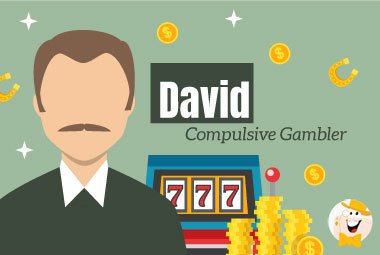
David, the Compulsive Gambler
It’s not only they were unpaved roads, my friend, but without help, there would be no roads. Only woods. When you meet your Goliath, it usually happens somewhere far away from the safe zone.
It takes miles to get there but requires mileage — rough but rewarding — to return.
Some habits just die hard.
Chances were on my side in the beginning, though. After college, I married Louise, my high school sweetheart. She got the job in Seattle, I worked in Redmond, we rented a big apartment, enjoyed the outdoors, bought used 40-feet sloop, sailed Baja California, read books, got two kids, my angels, bought the house. Life was, well, life.
But what do ya know, we were not to last. Was it her, me? Who cares? We got divorced ten years later. Kids went with her (it’s natural, right?), I got depression nails in my head.
My father’s heart attack provided for the sledgehammer. After the funeral, I took unpaid leave, jumped on my Harley and rode purposeless across Pacific Northwest for weeks to come. Don’t even remember how I ended up far down in Vegas.
Went in the casino for the first time in my life and made my initial $10,000 kill for the weekend. Felt so good. Like anesthesia.
A few hours later, when I regained my senses — and memories — I got straight back for more. Won another grand. Man.
Sat on my Harley, thought that was it.
So naïve. In a matter of weeks, I have unleashed gambling romper stomper.
I was a good player. I practiced what Jack, Bob, hell, even Phil, preach. Plus, have a bachelor degree in economics; I’m really good with numbers.
Gambled everywhere I could; laid my bets on anything. But nothing could erase the strain.
Eventually, losses settled in. Big ones, bigger, huge. Could not cover it. Tried to get back to work but they hired another person.
In a year, I sold my boat, put the house on sale. Then my father’s ranch in Montana. Lost it all to gambling.
Borrowed two grand from Jerry, my best man. Later, a grand from another friend. Took a loan from the bank, $50k. Lost everything in a week in Vegas. Then put my Harley as collateral to some guy. Lost again.
Hitchhiked to home I had no more.
Went straight to the community health department, referred to a psychiatrist who recommended voluntarily treatment at the local center. Got out after sixty days with $20 bucks in my pocket.
Went straight to slot machines and got some, dunno, $100 or so.
Took a bus to see kids and spent time with them. Borrowed some money from Louise. Lied to her about reasons. I relocated, took a job as a warehouse supervisor at renovating company in Lexington, Kentucky. Bet some on horse racing, nothing much.
A month later I won $4,000 — a big hit. Next weekend, I was off for Vegas, again.
Lost everything in a day.
Again.
Got picked up by police for an overdue bike rental when I got back. The judge fined me $200. I knew I had $60 in the checking account, so I wrote a bad check. Yup, got picked up again a couple of weeks later. Only this time, I got nine months at Blackburn Correctional Complex in Lexington.
Missed my kids’ birthdays for the first time in my life.
I got out and went on drift for months. Took odd jobs to have somewhere to sleep, something to eat. I knew I could come back on my feet if I could just make one big hit in Vegas.
Went to see my mom at the retirement home and to borrow some money. So ashamed, man. Such a pain of guilt. Unbearable. “My baby,” she said and hugged me.
Took my widowed mother’s pension check and went straight for Vegas.
Stayed the night before at a friend’s place in Flagstaff. Stole her golden jewelry and sold it in Vegas for two grand. Later, on the trial, she said that it was worth $6,000 at least. By the early morning next day, I lost everything on blackjack and poker.
I was sentenced to two years and spent ten months with serial raper in the cell.
My mother passed away while I was in jail.
When I got out, Louise didn’t allow me to see kids. You know what? She was right. You can go to the well for only so many times before it runs out dry.
Not much later, in summer 2006, I visited the psychiatric clinic in Maryland and literarily begged for help on my knees. I never cried that much in my life. Not even when I broke both of my legs in sixth grade. I still cry to this day.
Jerry and Carol, his wife, covered all expenses.
My therapist had her residency at Dr. Custer’s clinic for compulsive gambling years ago. Actually, he was her mentor. It helped. For the first time in my life, someone actually understood what I was going through.
Six months later I won myself again.
Not entirely. A bridgehead. But it was a start. No, I’ll take it back — it was the salvation.
I’ve been on the wagon, if you will, for twelve years. Worked lots of different jobs. Currently, I work in the accounting department at the advertising agency in Boston, Massachusetts.
I volunteer in two counseling centers for compulsive gambling and talk to a couple of compulsive gamblers by cell or video chat, every day. Just talk. Or stay silent and listen. Whatever they may need. Been there.
I run marathons, work out, go to church every Sunday. I repaid my debt to Jerry and Carol. I enrolled in an advanced degree program in human resource department at Framingham State University. Would love to work as a gambling addiction counselor someday.
I’m a grandpa now. Kids are on the West Coast, see them on Skype. Louise got remarried. Never wanted back the money she borrowed me.
My lasting emotions?
Fear. Fear that I will slip, be weak, and betray myself again. Not afraid, though, for I do not walk alone. And hope. Hope that one day my hole of remorse will heal and that at least for a while I will be whole.
One more thing.
This Goliath, as my therapist named a monster of compulsive gambling disorder — “and David did defeat his, so shall you yours, in your own way,” she used to say — or any psychological disorder for that matter, you don’t get to kill it.
“All the gods, all the heavens, all the hells, are within you.”
You just can’t. If you try, it will destroy you. You’re trying to kill yourself.
Tame it, befriend it, and accept it. Understand that it is part of you and will always be, and let it live alone, abandoned, deflated.
It will never go away, but will eventually fade away. Into the darkness while you remain in the light.
And if you find yourself in the shadow, give me a call. I’ll be there. Anytime.

Help Me Help You: Protection from Ourselves
Majority of us realize and accept the consequences of our decision for most of the time. We understand the power of choice we’re endowed with as human beings. Occasionally, though, we don’t take the bad ones with ease for they tend to cost too much, not only in money.
It takes time to learn to manage ourselves properly. Thus, we develop safety measures.
For example, to somehow amortize the effects of our potential bad decisions in driving we install guardrails at almost any road. Be it on highways or mountain top roads, they — our invention and initiative — serve us with good purpose as a last safety measure. We understand the value of that kind of protection quite well.
In gambling, where our choices are potentially amplified by financial gains or losses, there are so many levels that require safeguards, particularly when we take our nature into considerations.
In the industry that generate almost half a trillion dollars annually — enough to fully fund the United States Department of Defense for seven and a half months, including war funding, per FY19 military budget — the multitude of safeties has to come in form of well-regulated markets and online jurisdictions.
Because at the end of the day, we’re talking about human beings here.
We need more transparent communication, open dialogue, perpetual education, and empowerment of society to understand and properly embrace all aspects of gambling as a complex social phenomenon.
We need to keep developing viable industry standards and criteria, reliable business practices, compliant software solutions and algorithms, and certification methods that will provide for necessary gambling protection, security, and overall fairness through sustainable legal frameworks.
Above all, we need to continue with unified and focused efforts of all parties involved — players and casinos as outliers, legislators, regulation bodies, and affiliates as connecting members of the set — in building the meaningful gambling spectrum.
Surely, a segment of public opinion can often look to gambling in ‘them casinos’ terms and a number of legislators may think that banning is the most effective solution, particularly in the domain of online gambling. Potential RAWA is the product of this view.
History teaches that it’s a shallow logic. Revenue reports provide evidence that such reasoning is not supported by players at all. The demand is on the rise because we gamble, and we gamble a lot. Thus, it might be safe to assume that prohibition is not a long-term solution.
Instead, it is the legalization, implemented and controlled by professionals and selected experts, which can provide for a much-needed balance in the gambling field.
This brings us to legislators, relation authorities, and affiliates.
The regulative bodies develop and advice on legal frameworks to be legislated, while they serve as supervisors and enforcers. They are of paramount importance. But, in a way, they can also be seen as establishments that simply define the length of the leash industry is on.
But who is indeed to guard the players and casinos, two interpolated members of gambling set, not only from each other but from themselves too, fully in line with regulatory and legislature structure?
The most dedicated and professional affiliates as the industry watchdogs on the regulators’ leash.
Companies with accumulated knowledge and experience to offer proper players’ protection, education, game strategies, advice, casino reviews, warnings, and yes, bonuses too, but more importantly, the multi-layered value that serves us all — states or countries, players, and casinos.
Such a selected group of affiliates is, if you will, the pilot that boards any tanker as it passes through Panama or Suez Canal. Both canals are shortcuts that save us a lot of money and time. But regardless of the ship captains’ seniority, the pilot’s presence onboard is mandatory.
Run professionally and based upon proper corporate values, professional affiliates can provide for the safe gambling passages.
If it is up to H2 Gambling Capital projections, our canals are only to grow. It is estimated that in 2023, the annual gambling revenues will exceed $493 billion, growing on 2% average CAGR.
New players will emerge.
Ann, Jack, Matt, Brian, Bob, Phil, and David were not afraid to reveal who they are. What about the others?
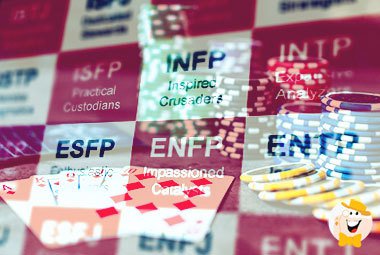
MBTI and Gambling
Myers-Briggs Type Indicator (MBTI) — providing for the differing psychological preferences on how people make decisions and how they perceive the world around them — comes at handy here. Basically, the system revolves around four axes:
- Worldview: do we focus on the inner or outer world, which is known as introversion (I) or extraversion (E);
- Information: do we focus on basic info received or do we like to interpret and add meanings, which correlates to intuition (N) and sensing (S);
- Decisions: do we base them on logic and consistency, or prefer to look at the people and circumstances, which is called thinking (T) or feeling (F);
- Structure: in our dealings with life, do we like things to be decided or to remain open to new developments, which are defined as judging (J) or perceiving (P).
MBTI’s profiling output correlates to 16 possible personality types that people can fit in.
Regardless of personal gambling proclivities, MBTI can be a helpful tool for personal growth, understanding, and meaningful life.
It is only natural, then, to peek into each type and see how they might fare in gambling.
INTJ (The Architect): Confidence at Play
One of the rarest types of all MBTI (two percent of the population), architects are confident players for they perpetually strive for knowledge and enjoy in their (usually high) intellectual levels. They rely heavily on introversion, intuition, and judgment, but it is the thinking that sets them apart. For INTJs, it has to be logic and must be analyzed in their powerful back end. These people are not into the leap of fate thing at all. They need a plan for everything and will act upon it only if they are assured of the success and benefits. Regardless of the attraction. Not an average Joe-the-gambler, right? No. As low-risk takers that love security, INTJs would most likely be engaged in strategic games like Texas hold ‘em where their brilliant thinking could compensate for luck factor. Usually highly confident persons, they would probably prefer brick and mortar casinos bit more than online ones, since they could benefit from the presence of other players and their telltale signs. It is assumed that Nikola Tesla, John Nash, Thomas Jefferson, Donald Rumsfeld, Dwight Eisenhower, Jane Austen, and Lance Armstrong are INTJs.
INTP (The Logician): Logic at Play
Also known as The Philosophers, INTPs enjoy in high intellectual levels and enormous creative capacities. They are permanently thinking about new ideas, inventing new concepts, abstract strategies, and stuff, and may often seem completely detached and indifferent to the remaining 97% of the world. On the other hand, failure is the worst nightmare for INTPs, to the point that they willingly reevaluate their own ingeniosity just to avoid it. In gambling, it correlates to a low likelihood of slot games, sports betting, and lotteries. Their mental capacities are more attuned to poker, blackjack, occasionally little wheel, rarely baccarat. Benefits of logical thinking and intuition would do them well in poker, just as analytical mind and strategic worldview would help them make gains in blackjack. To the certain point, though, for INTPs don’t like to take high-risks unless they’re absolutely certain of the outcome. However, if assured, INTPs revel in adrenalin rush and strive for it, thus the land-based casino would suit them better than online one. Naturally logical creatures, it is presumed that Albert Einstein, Charles Darwin, Immanuel Kant, Abraham Lincoln, Dustin Hoffman, and Larry Page are INTPs.
ENTJ (The Commander): Strategy at Play
Commanders are natural-born leaders gifted with charisma and confidence. Representing three percent of the population, they project authority worthy of crowds gathering around them. Fueled by an extreme level of rationality, they are capable to achieve any goal they set for themselves by using the inner drive, determination, sharp minds, and readiness to take risks. Strongly-willed, they often impose their logical views on others when it comes to preventing irrational developments. Gambling-wise, INTJs will gladly engage in table games, poker and baccarat mostly, for it would provide them with the opportunity to demonstrate intellectual superiority, plus offer a great opportunity for a good challenge they just love. While land-based casinos offer far more to INTJs than their interactive counterparts, it is of paramount importance for INTJs to set their limits firmly for they are susceptible to arrogance, condescension, and an occasionally significant level of insensitivity, which is when they can run into serious troubles. On the other hand, INTJs read people amazingly which provide for much-needed balance. It is believed that Steve Jobs, Margaret Thatcher, Franklin D. Roosevelt, Bill Gates, David Petraeus, and Warren Buffett are ENTJs.
ENTP (The Debater): Knowledge at Play
As independent thinkers and knowledgeable people, Debaters enjoy in demonstrating their quick wits, not so much for the sake of deeper meaning or purpose but for others to see it clearly — because it is so much fun. They truly enjoy mental sparring and in an opportunity to connect the unconnected dots. If you want your hairline split into three parts or a problem realized from any conceivable angle, including from your own shoes, ENTPs are probably ones you’d like to see. Pursuing such levels of intellectual understanding, Debaters will more than likely to engage their brilliant minds into gambling. Any variant of poker and blackjack in brick and mortar casino would suffice, providing with the opportunity to exercise their knowledge. ENTPs would probably engage in low-risk bets since they avoid the grunt work necessary for big wins, which may be explained by the fact that they represent only three percent of the population. Also, their propensity to pick apart everything other side does might lead to painful experiences in high-stakes games. Walt Disney, Thomas Edison, Leonardo da Vinci, Alexander the Great, Socrates, and Tom Hanks are likely ENTPs.
INFJ (The Advocate): Intuition at Play
The rarest type, making up less than one percent of the population, Advocates are walking paradox. Soft-spoken with a very strong opinion, tireless fighters ready to lead any battle as long as they believe in the cause only to vanish once the idealism and morality are gone, decisive and strong-willed for others but rarely for themselves, INFJs use their creativity, convictions, sensitivity, and highly developed intuition to create balance. When you think of Advocates, think of introverted egalitarianism and meritocracy. Unlikely to become fascinated by gambling, INFJs love the challenge and risk-taking rush it provides. As intuitive and strategic thinkers focused on the big picture, they are more likely to be attracted by sports betting or roulette than table games or one-armed bandits. Their foresight ability also makes them outstanding backgammon players, while they might occasionally excel at baccarat. However, if Advocates establish a connection with the game, it may be extremely difficult for them to detach. Heavily affected by any type of failure, INFJs should set their limits when it comes to optional crossing into high-stakes games field. Martin Luther King, Nelson Mandela, Carl Jung, Plato, J.K. Rowling, and Gandhi are believed to be INFJs.
INFP (The Mediator): Ideals at Play
Making up for four percent of the population, Mediators are the type of people you want on the lifeboat. Always seeing silver linings, they are calm, astute, driven by honor, beauty, morality, and virtue able to sustain their inner flame and passion. Ready to go to the extremes in order to reach the goal they believe in (as true idealists), INFPs can be quite good gamblers because it can provide them with an outstanding fun when they need to detach themselves from society (which they do). Relying heavily on intuition they can be very good with slots and roulette, possibly even baccarat, while other table games may not be able to provide for desired excitement and entertainment. INFPs should be very careful when gambling since they are prone to lose themselves in their quests, occasionally even drift away, lose touch, and enter hermit mode easily, which make them potentially prone of becoming problematic or even compulsive gamblers. In an ideal world, INFPs (just as INFJs) should be accompanied in casinos by persons of their trust. It is assumed that Shakespeare, Julia Roberts, George Orwell, Van Gogh, Warhol, Bob Marley, and Derek Jeter are INFPs.
ENFJ (The Protagonist): Control at Play
Similar to Commanders, Protagonists are charismatic, natural-born leaders that represent approximately two percent of the population. They are passionate, authentic, concerned and altruistic, unafraid to speak when they feel it’s needed. With only extroversion that sets them apart from INFJs, they are fueled by the same principles that often lead them toward politics, teaching, or coaching, where they can exercise influential confidence that can guide others toward improvement. When it comes to gambling, Protagonists would make good poker or blackjack players since they love to exercise control. It is more likely that they will play in brick and mortar casinos, against other players, relying on their ability to read people and high levels of intuition. While roulette might seems to be a bit off for Protagonists, it is not inconceivable to imagine them as very good players once they befriended its strategies. ENFJs should make for the least problematic players in casinos and would probably be liked by dealers for their generosity. Barack Obama, Oprah Winfrey, Jennifer Lawrence, Michael Jordan, Goethe, and Abraham Maslow are likely ENFJs.
ENFP (The Campaigner): Excitement at Play
Representing seven percent of the population, Campaigners are free spirits. Charming, energetic, compassionate, independent thinkers and highly sociable persons, they see life as a big riddle not to be solved but enjoyed in through emotions, compassion, and mysticism, looking for deeper meaning. Often thrusting into the spotlight where they excel, ENFPs need to have the freedom to be innovative; in fact, their self-esteem depends on it. They can also exercise overreliance on their intuition leading them to misread the signs, which in turn often results in frustration when they realize there was a less complicated way to do things. These two peculiar traits (inter-dependable self-esteem and frustration) are what require ENFPs to exercise very careful approach gambling. Their energy and joy of socializing make them attracted to the opulence of land-based casinos and table games like poker, roulette, even noisy and exciting game of craps. They enjoy the thrill of playing and the excitement of taking risks since they thrive in being rewarded. Thus, in gambling, ENFPs should set their limits prudently. It is presumed that Robert Downey Jr., Will Smith, Drew Barrymore, Anais Nin, Tom Brady, Orson Welles, and Che Guevara are ENFPs.
ISTJ (The Logistician): Seriousness at Play
Representing the largest, most abundant type (13% of all population), ISTJs characteristics are responsibility, integrity, practical logic, seriousness, and tireless devotion to duty. They are not impulsive, don’t take risks, they analyze and fact-check surroundings with little assumptions; as no-nonsense people with little tolerance to indecisiveness, they have the sharp, fact-based mindset, with a high sense of personal integrity. On the other hand, Logisticians tend to lose patience when challenged by unconventional, impractical or unviable theories; their stubbornness in control, stability, and efficiency can result in a strain that can go unchecked for years. When gambling, ISTJs usually play poker, and can indeed excel at it — ISTJs may struggle to express emotion or affection externally, a good trait for poker face — while they often consider other games too volatile for their taste. Their character enables them to utilize strategy and rules to their benefits. However, they should take good care when playing against eccentric players that might get under their skin. George H.W. Bush, Condoleezza Rice, Jeff Bezos, Peter Thiel, Evander Holyfield, Robert De Niro, Denzel Washington, Stonewall Jackson, and Sigmund Freud are thought to be ISTJs.
ISFJ (The Defender): Perfectionism at Play
As a quite unique personality type that constitutes 13% of all population, ISFJs have excellent analytical abilities, well-developed social skills (although they are introverts), are receptive to change even with their judging trait, posses great desire to do good, are meticulous and often perfectionists taking their responsibility on personal level going above and beyond on regular basis. Exceeding expectations and delighting others come naturally to Defenders although they are humble, underplay their accomplishments, and stay out of the spotlight at any cost. In gambling, ISFJs can often rely upon their excellent memory and perception which potentially makes them good blackjack players. Since they prefer to compete with themselves more than with the others, iGaming may be more likely choice since it offers a number of RNG games that ISFJs can easily correlate to. Defenders can also be outstanding backgammon players. While not too susceptible to compulsive gambling, they should pay attention to their perfectionism trait that can sometimes lead them just one step too much. It is believed that Halle Barry, Beyoncé, George Marshall, Mother Theresa, Tiger Woods, Agatha Christie, and Selena Gomes are ISFJs.
ESTJ (The Executive): Calculation at Play
Executives are persons of high morality that clearly distinguish right from wrong, embrace the high value of honesty, dedication, and dignity, while they truly believe in the rule of law, earned authority, and rejects laziness and cheating. Representing eleven percent of all population, ESTJs stick to their principles, verifiable facts, and above all, to their ability to analyze all details of the plan at hand before they make their final move. Their character traits probably make them least interested in gambling. The only driver they may have in games of chance is their perpetual desire to win. Thus, they would probably shun baccarat and roulette (considering aspect of luck involved) and lean towards poker and blackjack. On the other hand, if they are convinced that the odds are in their favor, they could make a significant stake, so it’s not impossible to envision them in sports betting. Considering ESTJs need for social interactions, they would probably be a bit more interested in land-based casinos, though live dealer online games may be sufficiently attractive. It is assumed that John D. Rockefeller, Frank Sinatra, Douglas McArthur, Michelle Obama, Ivanka Trump, Megyn Kelly, and Uma Thurman are ESTJs.
ESFJ (The Consul): Practicality at Play
Consuls, making up for twelve percent of the population, excels in representation of any kind making them very popular persons overall. They revel in the spotlight, setting the tone, leading from the front, are quite concerned about appearance, authority, and social status while at the same time they cherish altruistic traits and take their responsibilities seriously. They are role model, conflict-averse individuals that can sometimes be hurt when their ideas are rejected thus can face occasional sensitivity issues. When gambling, ESFJs would strive for games that offer the highest level of control they so keenly exercise in their lives. They would probably be a bit more interested in brick and mortar casinos than in online gambling, enjoying in luxury of roulette or baccarat with low-stakes bets, or in poker with bit higher bets (since it allows them to lead the game the way they like). When gambling ESFJs should be aware of they need to control the situation which often may not be the case in games of chance. Bill Clinton, Jenifer Lopez, Eva Longoria, Elton John, William McKinley, and Larry King are believed to be ESFJs.
ISTP (The Virtuoso): Spontaneity at Play
Constituting for five percent of all population, Virtuosos are the epitome of explorers with natural rationalism, curiosity, and inner drive to build useful things just for the fun of it. They revel in new ideas, troubleshooting, assembling and disassembling things, just as they enjoy in sharing their knowledge and experience with others. Possessing mechanical minds, they can be enigmatic, friendly though private, rather calm then spontaneous, curious yet unfocused, all in all — a challenge to predict as their realism, emotions, and sense of fairness intersect. To no surprise, Virtuosos tend to like to gamble and it comes naturally to them. While land-based casinos may appear slightly more enticing to ISTPs than online ones, they would probably make for good poker and blackjack players, or any game that provides for the strategic display of their mindset. Advanced sports betting might also suffice. On the other hand, Virtuosos should be well aware of their need to make a reasonable profit out of their activities when they gamble. Clint Eastwood, Scarlett Johansson, Bruce Lee, Ernest Hemingway, Vladimir Putin, the Dalai Lama, Melania Trump, Miles Davis, Shaquille O’Neal are presumably ISTPs.
ISFP (The Adventurer): Competitiveness at Play
Probably most artistically attuned of all MBTI types, Adventurers like to push the limits of conventions and upset traditional expectations a lot. They tend to live their inner, colorful, sensual world inspired by ideas, people, concepts, and experiments with perspectives. Above all, they seek the thrill of riskier behaviors in an irresistible manner although they are sensitive to feelings of others, and value harmony. Consequently, ISFPs face criticism in a hard way and their biggest challenge is planning for the future. Their traits make them not only susceptible to gambling but drawn to it. For Adventurers, games of chance may be a way to push their limits and challenge them. They are likely to be equally entertained both in land-based and online casinos, just as they are likely to enjoy in the majority of games for they see winning as a great personal accomplishment. This is also why they should take gambling with caution and establish their limits wisely since it’s likely they would face great gambling losses with difficulty. It is believed that Lady Gaga, David Bowie, Marilyn Monroe, Rihanna, Jimi Hendrix, Yogi Berra, and Ulysses S. Grant are ISFPs.
ESTP (The Entrepreneur): Risk at Play
Making up four percent of the population, Entrepreneurs like to be at the center of attention with their energetic impact on immediate surroundings. Constantly on the move, they’re not shy to take a leap before they look, working out details as they go; they enjoy in drama, passion, and pleasure not so much for the emotional thrill as to stimulate their intelligent minds. Activities formulated in an organized or formal manner are major put-downs for ESTPs that see rules as something to be broken. Enjoying in probably the most perceptive mind of all MBTI types, ESTPs can notice the smallest possible changes. Not surprisingly, Entrepreneurs are drawn to gambling in any realm. Their logic would find high-risk games very intellectually stimulating and might not resist them. Thus, they might opt out for baccarat, roulette, slots, or blackjack — lack of control might be too enticing — just as they might find high-stakes poker games pleasing enough. That is why ESTPs should approach gambling very carefully. Madonna, Jack Nicholson, Harry Houdini, Donald Trump, George S. Patton, Mike Tyson, and Dale Carnegie are presumably ESTPs.
ESFP (The Entertainer): Carelessness at Play
Spontaneous and easily drawn to the excitement of the moment, Entertainers love the spotlight on the grand scale, enjoy in socializing, possess great aesthetic sense, curiosity, sense of drama, and passion. Relying on luck or chance, ESFPs avoid any complex analysis and repetitive responsibilities that may point out the real consequences of their challenges. While they recognize value and quality, Entertainers are prone to live beyond their means and to leap into unaffordable opportunities for they are curious, immediate-pleasure loving beings. ESFPs are likely to see gambling as a social opportunity or hobby enticed by horse (or greyhound) betting or to casually enjoy in land-based casino games. Having such a connection with luck in their lives, it is quite possible they might be good baccarat or roulette players. However, ESFPs should be very careful when it comes to keeping their bankrolls in line and could be susceptible to significant losses if not checked on time. It is assumed that Ronald Reagan, Elvis Presley, Pink, Paul McCartney, Marc Cuban, Sir Richard Branson, Hugh Hefner, Leonardo DiCaprio, and Serena Williams are ESPFs.
Closing Balances & Ticking Clocks
While we may not like the idea of taking chances that much, it is impossible to calculate their true volume in our lives. Nor we do strive to do so — that’s what history, philosophy, other humanities, and academic disciplines are there for.
However, when we take our luck into considerations, it is difficult to resist a few simple conclusions.
We are all same on the inside. We like to gamble, one way or the other, and we do it more often than we realize.
To the corporate executive, career advancement move may resemble a poker game; if one raises a bet too soon, it may be too late to fold. To the creative director, getting the inspiration might be equal to a single line online slot hit; a wild symbol or scatter would not hurt at all. Predicting NYSE trading value can resemble craziest roulette games; if only there was d’Alembert at hand in 2008. Anticipating the introvert’s reaction on a date can be trickier affair than betting on craps; pass, don’t pass, no come out roll — oh man.
Same can be said of our toddlers’ jumps, parents’ replies, vehicles breakdowns, Super Bowl performances (remember 2017?), basketball games, or any risk and reward process we’re willing to undertake.
The only difference between gambling in the casino and taking chance in life is in the game we choose to play and the currency we use.
That is why it is up to us to understand that the games’ takeaways are always a matter of our choices. We decide what we take from them, not the other way around. It is the impact on our lives that makes gambling such a complex social phenomenon.
We tend to see it as an activity that results only in financial gains or losses. To the contrary, it can also deliver lessons or achievements that don’t have to be learned or made by posterity in a hard way but as our investment into their future.
In times of colonial America, lotteries were used as a means to finance construction of much needed social infrastructures. In the age when we’re facing serious decisions about economic stimulus programs that are to address both climate change and economic inequality, why can’t we use our obvious proclivity to gambling to make an impact in this area?
If we are to commit ourselves to policies that are to reduce greenhouse emissions, end fossil fuel extraction, and ultimately lead towards the transition to 100% clean renewable energy by 2035, it will require and dictate significant cost. Who is to say that efficient taxing of legal, well-regulated gambling — beneficial to all parties involved — cannot contribute to this globally, almost existentially important cause? (Just a thought.)
One way or the other, fact remains — we’re complex, powerful, brittle, young, advanced beings with unprecedented potentials, understanding, knowledge, experience, and technological marvels at hand. We have established supreme social and legal instruments compounded only by our sense of freedom and equality. We have so much more to discover, so many places to go, a number of unknown unknowns to meet and firsts to make. And, to top it all off, we apparently like to play games of luck and skill — a lot.
There is nothing to stop us from integrating gambling into our lives legally and finally balance our luck and choices in a meaningful manner.
Nothing stands in our way. Except us.






Trinzies 5 years ago
5 years ago
Really insightful stuff. Surprised to see myself akin to more than one you. It'll be interesting to revisit this in the future to see whether I'll still relate to the same or will I "evolve" into a whole different kind of player?
Please enter your comment.
Your comment is added.